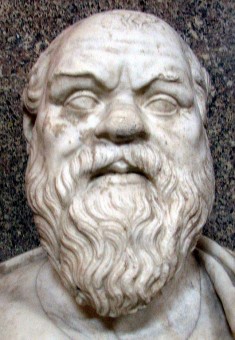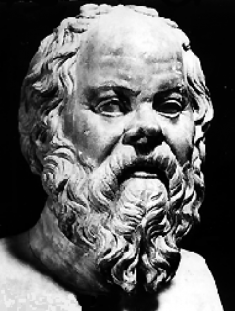| Socrates | |
|---|---|
 |
|
| Classical Philosopher | |
| Specialty | Western philosophy |
| Born | c. 469 / 470 BC Deme Alopece, Athens |
| Died | c. 399 BC (about age 71) Athens |
| Nationality | Greek |
While some could argue that other philosophers were more impacting in terms of the effect on human development, it can be said that Socrates established the proper way to conduct studies and insights into philosophy. His actual insights into human nature and virtues were groundbreaking. However, he did pay the ultimate price for his achievements.
Early Years of Socrates
Socrates was born circa 470 B.C. in Athens, Greece. His early life is pieced together from three major sources: the works of Plato, Xenophon, and Aristophanes. Exact records of his life were never kept and, if they were, they have been lost. Socrates was the son of a stonecutter and, before he would become known as a philosopher, he worked as a stonecutter as well.
References to Socrates’ life in the works of the Plato, Xenophon, and Aristophanes can be somewhat contradictory. One source noted that he became a teacher of philosophy for money, and in the Apology, Socrates noted that he was impoverished, which could be proof that he did not accept payment for teaching. The sources also indicate Socrates was involved with military service and saw war action in many critical battles.
From much of the confusion over the early life of Socrates arises the Socratic Problem. What this refers to is the inability to determine how much of Socrates’ philosophy is accurately presented as his. Plato, for example, uses Socrates as the main character in his Dialogues. The question is, then, whether Plato really quoted Socrates or infused his own original musings. One of the major reasons for the Socratic problem is the extensive writings of Socrates have been lost. We are only left with a partial picture of the man’s actual words and philosophical bent.
The Philosophy of Socrates
 Socrates held a number of very strong beliefs. One of which was the notion that virtue could not be taught. This was considered antithetical to the belief system that was common in Athens at the time that Socrates lived. He also noted that a person should always be in search of knowledge and wisdom. Within this context was the notion that a love for wisdom would be intrinsically connected to a love of the arts.
Socrates held a number of very strong beliefs. One of which was the notion that virtue could not be taught. This was considered antithetical to the belief system that was common in Athens at the time that Socrates lived. He also noted that a person should always be in search of knowledge and wisdom. Within this context was the notion that a love for wisdom would be intrinsically connected to a love of the arts.
Socrates’ insights on virtue are among the most poignant observations on morality ever crafted. Socrates was a proud believer that material gain could be harmful to a person’s soul. The goal a person should always have is to live a good and virtuous life rooted in self-development. According to Socrates, those who chased material things in life generally are denying themselves the ability to truly and fully develop as virtuous persons.
The Socratic Method
The Socratic Method remains one of the most important components in the overall development of Western thinking and philosophy. The overarching theme of the Socratic Method is always good and justice. However, the actual systematic approach to dealing with a problem related to morals, ethics, and, honestly, any other subject, is relatively simple.
Basically, with the Socratic Method, a problem is put forth and then the problem is addressed by asking a series of questions about it. Eventually, through a series of well-thought out responses, the thinker arrives at a solution to the problem. Granted, the more complex the problem, the more questions will need to be asked. The questions do have to be deliberately thought out in order to truly have value. Such is the nature of serious inquiry.
The Trial of Socrates
While those in the modern world do truly honor Socrates as a great thinker and philosopher, his ideas were considered radical at the time. In fact, Socrates was considered a threat to the established order and this is why he had to go through a trial. The politics and social climate in Athens was antithetical to what Socrates was teaching. Hence, he was charged with corrupting the youth of Athens.
It is believed that had Socrates simply resigned himself to keeping quiet about his beliefs, he would have been freed. He did not and he stood trial. He even had the chance to escape from jail, but he refused to do so. Ultimately, Socrates did stand trial and Plato documented what had occurred during the trial. He was found guilty and sentenced to death. The method of his execution was a strange one. Socrates was required to drink hemlock, a type of poison, which he did.